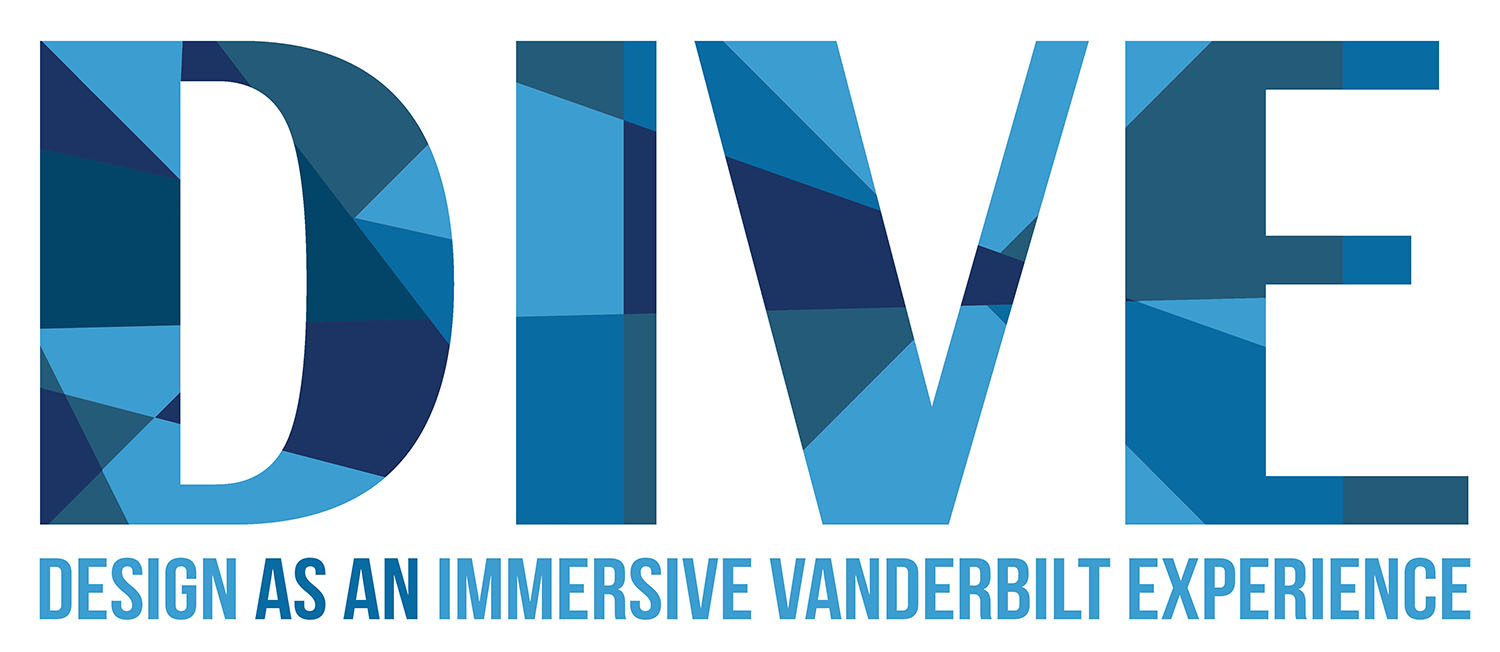The Design as an Immersive Vanderbilt Experience (DIVE) Quality Enhancement Plan (QEP) is a critical part of the university's ten-year reaffirmation of accreditation by the Southern Association of Colleges and Schools Commission on Colleges (SACSCOC), and constitutes a new and focused effort to enhance student learning. DIVE was created within the context of Immersion Vanderbilt in support of the Academic Strategic Plan. The goal of DIVE is to teach human-centered design thinking to students so that they may solve complex, real-world problems, develop critical thinking skills, and work in multidisciplinary teams during an immersive, faculty-guided project.
About DIVE
DIVE (Design as an Immersive Vanderbilt Experience) will create an additional outlet for pursuing immersion experiences, as part of the Immersion Vanderbilt initiative. DIVE will bring together small-interdisciplinary teams to learn human-centered design methodology to facilitate problem solving. Each team will be led by a faculty or staff member and will address broad ranging questions such as:
-"how do we increase usage of public transportation in Nashville,"
-"how can we make the cafeteria experience better for Vanderbilt students,"
-"how do we make public data sets readily available to the public?," or
-"how do we improve the patient comfort experience before surgery?"
Topic Selection & Implementation Process
On September 4, 2015, Provost and Vice Chancellor for Academic Affairs Susan R. Wente issued a call to the Vanderbilt community to submit program ideas for the Immersion Vanderbilt QEP. Students, faculty, staff, and alumni submitted a total of 44 program ideas, of which three were chosen by the Immersion QEP Committee to be developed into formal ten-page proposals by broadly representative subcommittees of students, faculty, and staff.
The three finalist proposals included:
On February 1, 2016, the Office of the Provost began soliciting feedback from the campus community on the three finalist proposals that were accessible online. Campus members were invited to attend the QEP Town Hall meeting on February 29, 2016, during which members of the QEP subcommittees shared their ideas and answered questions. Following a QEP proposal presentation by Vice Provost Cyrus, feedback was solicited both in person and through a questionnaire from the Vanderbilt Student Government (VSG). In addition to numerous in-person discussions and presentations, a total of 77 separate written comments (through physical and online feedback forms and emails) were received and reviewed by the QEP Topic Selection Committee.
Following the two-month comment period, the Immersion QEP Committee carefully reviewed the three finalist proposals in light of the community’s feedback, and recommended the selection of Design as an Immersive Vanderbilt Experience (DIVE) as Vanderbilt’s new QEP. On May 12, 2016, Provost Susan R. Wente subsequently authorized the selection of DIVE as Vanderbilt’s Quality Enhancement Plan.
Vice Provost Cynthia J. Cyrus convened the DIVE Finalization Committee to draft the formal QEP proposal that was submitted to SACSCOC for approval in February 2017. This process included the build-out of an implementation and assessment plan.
Immersion QEP Criteria & Guidelines
As Vanderbilt's new QEP, DIVE is focused on Immersion Vanderbilt and meets the following institutional criteria:
- Academically rigorous;
- Conducted outside of or beyond the classroom;
- Includes faculty guidance;
- Yields a tangible, measurable product.
In addition, DIVE is consistent with the goals of the Academic Strategic Plan, is within the capacity of the university to implement and govern, and will be accessible to all Vanderbilt University undergraduates, regardless of their major, minor, or undergraduate school.
DIVE also meets the following SACSCOC criteria:
- The QEP must be focused and directly related to student learning;
- The QEP must have clear goals;
- Vanderbilt must be able to assess the outcomes of the QEP and its effects on student learning.
Immersion QEP Committee
DIVE Finalization Committee
DIVE Assessment Subcommittee
Derek O. Bruff, director, Center for Teaching; senior lecturer, mathematics, College of Arts & Science;
Melissa S. Gresalfi, associate professor of mathematics education, director of graduate studies in teaching and learning, Peabody College; and
Richard J. Ianelli, senior associate director of research and analytics, Vanderbilt Institutional Research Group.
DIVE Program Subcommittee
A. Will Berger, undergraduate student, School of Engineering;
Alex Borowski, graduate student, Owen School of Management;
Derek O. Bruff, director, Center for Teaching; senior lecturer, mathematics, College of Arts & Science;
Clive Mentzel , senior lecturer, political science/public policy, College of Arts & Science; director, office of active citizenship & service;
David A. Owens, professor for the practice of management and innovation; faculty director, VU Accelerator-Summer Business Institute, Owen Graduate School of Management;
Ben Shapiro, doctoral student, Peabody College; and
Celia Walker, director of special projects, Jean and Alexander Heard Library.
DIVE Curriculum Development Committee
Chalene Helmuth, senior lecturer, Spanish & Portuguese department, College of Arts & Science; and
Alexandra A. Sargent, senior lecturer of theatre, costume designer & costume shop manager; College of Arts & Science.
DIVE Marketing Subcommittee
A. Will Berger , undergraduate student, School of Engineering;
Alex Borowski , graduate student, Owen School of Management;
Elizabeth C. Boyd, project manager, vice provost for learning and residential affairs; and
Celia Walker, director of special projects, Jean and Alexander Heard Library.
Reports and Related Documents
Letter from Provost Wente requesting QEP program ideas
Memorandum from Provost Wente regarding Vanderbilt's QEP Topic Selection
Design as an Immersive Vanderbilt Experience (DIVE)
Engaged Scholars Certificate Program
Intercultural Agility: Developing Intercultural Competence Across Multiple Contexts
Key Dates
October 19, 2015: QEP idea submissions due
November 16, 2015: Immersion QEP Committee charged three subcommittees to develop full proposals in the chosen thematic areas
January 15, 2016: three finalist proposals due
February 1, 2016: begin proposal comment period
February 29, 2016: Town Hall on QEP proposals at 5PM in the Jean and Alexander Heard Library Community Room
March 2016: QEP topic selection recommendations due to the Provost from the Immersion QEP Committee
May 12, 2016: announcement of the QEP topic by Provost Susan R. Wente
May 2016: convening of the QEP Proposal Development Working Group
February 2017: deadline for the submission of the full QEP proposal (including implementation and assessment plan) for SACSCOC review

